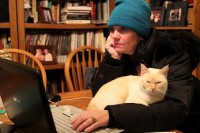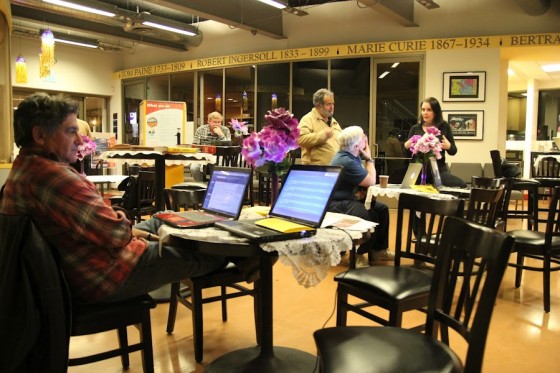The Wikapediatrician
You don’t even have to get out of bed to be involved with Susan’s concept. In fact, she spends most of her time in pajamas with her cats draped over her challenging and changing what people all over the world go to for their first taste of information on confusing subjects that claim to be paranormal. Wikipedia is huge. The potential for skepticism on Wikipedia is huge as well.
The thing is, everything at Wiki has to be “cited.” That means if there is no published information elsewhere to back up outrageous claims or that claim or information is edited by Wiki’s editors (one of which anyone can be… like YOU) as being “not noteworthy” such as proof that dead people can talk from a credible source, then guess what – it gets edited out by people like Susan who monitor people and incidents through Google Alerts on specific names. Read about James VanPraagh and Sylvia Browne at Wiki and you will see what I mean. They are dead meat and there’s nothing they or any of their fans can do about it. It’s almost like the world saying, “Hey, …prove it or we will hold you accountable!” There is not one single positive thing about Browne or VanPraagh at Wiki, simply because their isn’t any proof anywhere to substantiate their bogus claims there, thanks to bound and determined people like Susan Gerbic. How cool is that? If these cons pop up with some new piece of garbage, she goes to work to take out the trash and right the wrong information. It’s simple and easy to do once you get the hang of it.
Also in progress is Susan’s “Got Your Wiki Back” project. This is an attempt to make sure that if and when people go to Wiki to find out about someone in the skeptical universe, they are greeted with a decent write-up and good photographs. Susan gets a bug under her skin when she sees pitiful “stubs” or pages that should be representitive of our best skeptical minds casually put up at Wiki that are either weak in content, filled with spelling or grammatical errors, no pictures or woefully out of date information. Shame…
 If you didn’t know anything about that bearded guy James Randi and went to Wikipedia to get your first bits of biographical information on him, would you want to find one or two poorly written sentences without any pictures or up-to-date creds? We don’t think so – and the skeptical community has no one else to blame but themselves if such a thing happens with new up-and-coming rational thinkers as well as a few who are already up on Wiki . Get busy and learn how to straighten out the most contemporary source of information on the planet! This is the kind of job that needs doing, and like weeding in a vast backyard garden, Susan has been crying out for help for the last year – unfortunately without much success. Only a few skeptics have actually started consistently working this fertile territory. She has found that initially, people are gung-ho to get involved, but the numbers begin to dwindle after some apparently feel that such work might be technologically challenging. Wrong. It isn’t any more challenging than Facebook or Youtube folks.
If you didn’t know anything about that bearded guy James Randi and went to Wikipedia to get your first bits of biographical information on him, would you want to find one or two poorly written sentences without any pictures or up-to-date creds? We don’t think so – and the skeptical community has no one else to blame but themselves if such a thing happens with new up-and-coming rational thinkers as well as a few who are already up on Wiki . Get busy and learn how to straighten out the most contemporary source of information on the planet! This is the kind of job that needs doing, and like weeding in a vast backyard garden, Susan has been crying out for help for the last year – unfortunately without much success. Only a few skeptics have actually started consistently working this fertile territory. She has found that initially, people are gung-ho to get involved, but the numbers begin to dwindle after some apparently feel that such work might be technologically challenging. Wrong. It isn’t any more challenging than Facebook or Youtube folks.
Susan has been a guest on several of the biggest skeptical podcasts, had a spread in Skeptical Inquirer and the paper she read at TAM9 last year started a firestorm of interest. But interest is not enough. In a recent Cafe Inquiry meeting at Hollywood’s CFI Headquarters, Susan shared her feelings on this dilemma and other issues close to her heart. There really is no excuse. Imagine: If ten or twenty people per week scoured Wikipedia for whatever brand of woo or pseudo-science they chose to explore and spent an hour or so a week tuning that page up, it would have a tremendous effect on skeptical thinking world-wide. Susan also has plans to also get her best shots translated into other languages so that more and more people will form their own groups and keep up the pressure on un-critical information.
So if you have been lurking in the background, wringing your hands and bemoaning the impossiblity of making a dent in the hard shell of stupendous foolery masquerading as fact that grows by leaps and bounds every day – it’s time to boot up your computer and get on board. Work from the inside out. Invalidate the woo with fact-based truth and you will feel much better!
We Got Your Wiki Back http://guerrillaskepticismonwikipedia.blogspot.com/2011/06/guerrilla-skepticsm-of-skeptical.html
General Overview and Plea for Help (from July 2011) http://guerrillaskepticismonwikipedia.blogspot.com/2011/06/guerrilla-skepticism-on-wikipedia.html
Page Makeovers http://guerrillaskepticismonwikipedia.blogspot.com/2011/07/we-got-your-wiki-back-page-makeovers.html
Wikipedia in other languages http://guerrillaskepticismonwikipedia.blogspot.com/2012/03/forget-english-what-does-rest-of-world.html




I’ve been a part of Susan’s “guerrilla skeptics” for a while now, and I gotta’ say to all skeptic’s out there: helping to get science and skepticism into Wikipedia, and all the nonsense out, is one of the easiest ways to put your skepticism to work! It can make a real difference. I’ve done editing work on articles that receive thousands of readers every day. And it’s the kind of work that anyone can do, whether you have time every night or just want to spend an hour or two on the weekends. Every little bit helps!
And awesome post, Mark!!! I actually discovered the “guerrilla skeptics” project last fall by hearing an interview with you and Susan on Rational Alchemy. I was not an experienced Wikipedia editor, but with Susan’s help, I was editing in no time! Now I’ve done tons of edits and even a complete article rewrite. It’s a lot of fun!
Susan has been doing such fantastic work, I love to see skeptics picking a project and jumping in with both feet like this.
I’m going to be teaching a workshop on crowdsourcing projects for skeptics at TAM 2012 in July in Las Vegas. Wikipedia will be included, but we will also cover a number of other ways you can make a difference in skepticism while still in your pajamas in bed with a laptop. It should be fun.
Susan is a force of nature! We’re lucky she’s on the side of evidence.
Wonderful profile! Great that someone is doing this much-needed work, as Wikipedia is often the first source of information one comes across when seeking info on the web. Susan rocks! :)
Wikipedia evolves.
To grasp the scope of the analogy, consider that just as 99% of species that have ever lived are extinct, so too is 99% of information that has ever been on Wikipedia. (And that’s just counting the sensible stuff.)
If I were her, I’d be careful about being labelled the Wikipediatrician.
“A hospital paediatrician has hit out at vandals who forced her to flee her home after apparently taking her job title to mean she was a paedophile.
South African-born Yvette Cloete – a 30-year-old trainee consultant at the Royal Gwent Hospital, Newport, south Wales – said she planned to move home after returning to find the outside of her property daubed with the words “paedo”.”
http://news.bbc.co.uk/2/hi/uk_news/wales/901723.stm
Spelling bees save lives.
“Pedo-panic” has been going on for a long time in the UK. There have been numerous articles and shows about it and I would suspect that it’s merely for ratings. But people get alarmed and think there are more pedophiles than there actually are.
Sort of like here in the US. We have countless Law and Order style shows that inflate crime levels so people think violences is more prevalent than it actually is. Pedophiles are really not that common and violence is at all time historic lows.
Once again; although I appreciate all comments, can we plesse try and stay on track and disscuss the point of the blog: [Editing for skeptical content] and not trail off into sorting out tangential issues?
Ha, I meant to spell “discuss” correctly, my point exactly.
Great profile!
And yes, it’s extremely fortunate that Susan is on the side of reason. She currently doing all the heavy lifting in saving the “Reason Rally” Wiki page from the clutches of history-revising religious ideologues. I started my 1st Wiki edit after I spent 7 hours in the rain at this rally, and was stunned and what some people wanted (and may still want) to include in this article. Things that didn’t happen. Things that were supposed to have happened but that there was no evidence of. Statements repeated by people and cited repeatedly as if they were from different sources. Basically an attempt to denigrate and minimize the atheist viewpoint and this rally, despite there being only maybe a dozen protesters in a sea of 20 or 30 thousand ralliers for reason, and despite there being only the predictable number of criticial anti-atheist journalists.
This old African proverb bears consideration: “Until lions have their historians, tales of the hunt shall always glorify the hunters.”
As more people turn to Wikipedia for their facts and history, heros like Susan become even more important. Thank you, Susan and your team to watchdogs!
I’ve been saying that anybody can say anything on Wikipedia.
Have you tried? Vandalism and other crappy edits get reverted by others.
What I know is that truths about Bush’s war were disappeared from Wikipedia and happy talk BS took there places. And it was found that it was done from the Bush Whitehouse and the Pentagon. I’ve read that the loop hole that let a hacker find who was rewriting history was closed. If it happened then why not now? Who do you trust. The frist or the one who says its not true? You gotta check.
Of course you need to be tentative when using Wikipedia as a source,but that goes for ALL sources of information,no matter how solid their reputation is.But I think that studies have shown that Wikipedia’s content is at least as reliable as other widely used reference materials,especially when it comes to comprehensively studied subjects,such as mainstream science and history.Is it always right? Of course not,and neither was the Encyclopedia Britannica. At least Wikipedia can be edited (the point of this article,by the way)for mistakes,whereas a reference book,once published,can perpetuate a mistake until that volume is destroyed.
Deleting stuff without justification is also considered vandalism, which gets reverted.
The bigger problem are biased moderators who selectively enforce the rules according to their bias.
Max, there is an old adage about free speech that says “the answer to bad speech is more speech.” I truly believe this applies to Wikipedia too – the answer to bad editors is more editors.
This is precisely why Susan and I and others have long been encouraging skeptics to get involved. The more rational reality-based people we can get editing, the less those types of things you observed can occur.
FWIW, I delete stuff all the time on Wikipedia, and have rarely had a problem with being reverted. You need to explain what you are doing and why in the comments, and work with the other editors on that article.
This has been my experience as well. If you think carefully about what you are writing, and correctly cite it, your edit usually stays.
Wish we could all do this in the real world as well. What a difference it would make.
Kudos Susan, for your hard work!
I will say its its a lot better than newspapers and their opinion pages. Back in the day they really had people who knew things. Not like now when its all about repeating key code words. Without proof.
The thing is, everything at Wiki has to be “cited.” Not true. Oh, not true. There are so many balloons needing to be popped. So many [by whom?] or [citation required] on entries. But because it’s there, it’s fact.
Yes Jolly, there is a lot of work remaining to be done. Those citation required balloons are wonderful because it allows us to quickly challenge claims that are left.
Also allows us to quickly zoom in on areas that need work.
Far better than in the non-Wikipedia world. Not often can you put up a citation required balloon on a politician’s speech.
Questioning “facts” is what skepticism is all about.
Wow! Thanks for all the great comments and the article Mark.
Just want to quickly share this freshly released blog by Tim Farley. He is reporting on a new feature called Google Knowledge that has just been released in the USA. Google is trying to get the search engine to do a better job of locating the knowledge you are looking for.
http://skeptools.wordpress.com/2012/05/22/google-knowledge-graph-benefits-skeptic-wikipedia-guerilla-skepticism
What Google Knowledge means is that whenever you look for a name you will get the normal search results (usually the first link is to a Wikipedia page) on the left side.
But on the right side of your search you will see a picture of the person/place/thing as well as a few sentences about that person/place/thing and some suggested links that are associated with the person/place/thing.
Almost all (still not sure how much) is information pulled off of what is written on Wikipedia.
Go to Google and try it. What a amazing tool for Guerrilla Skepticism on Wikipedia.